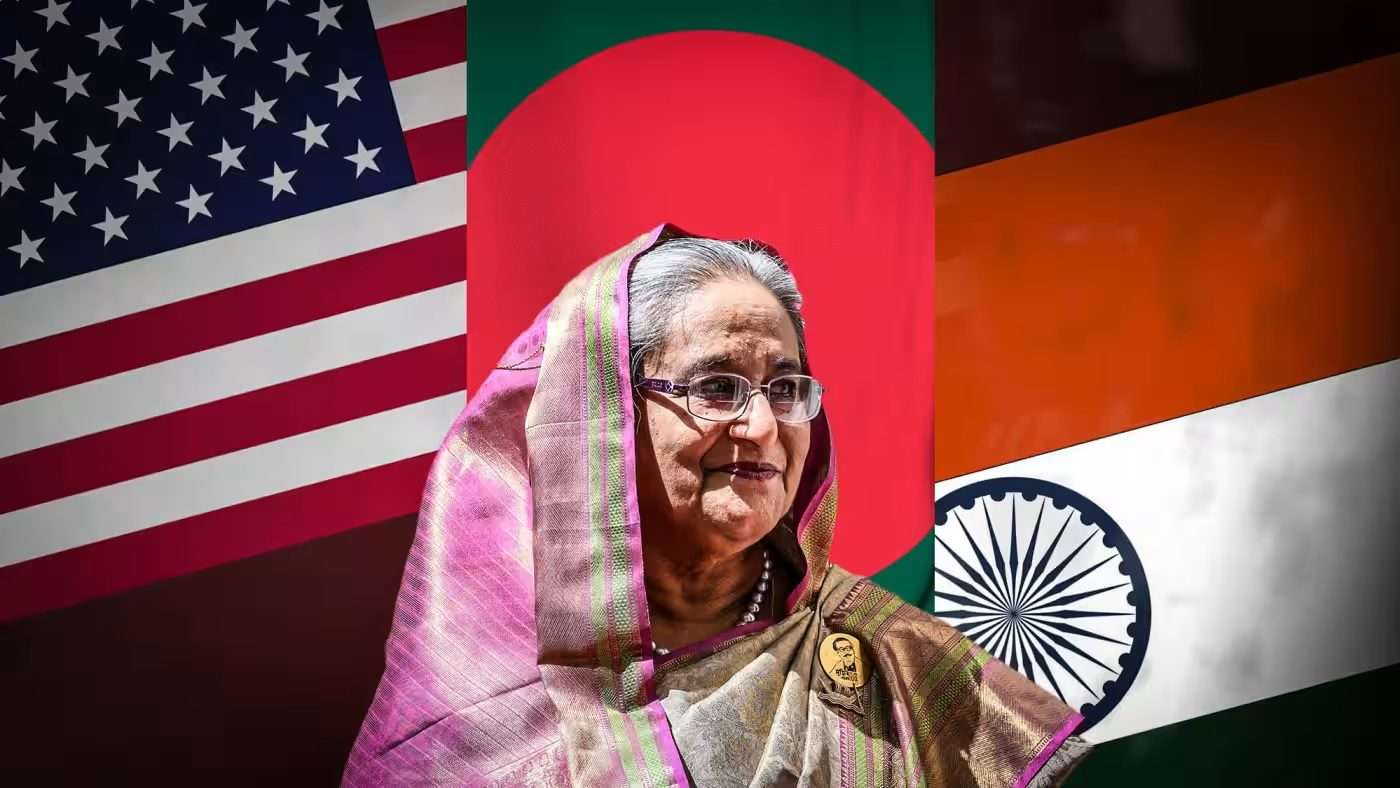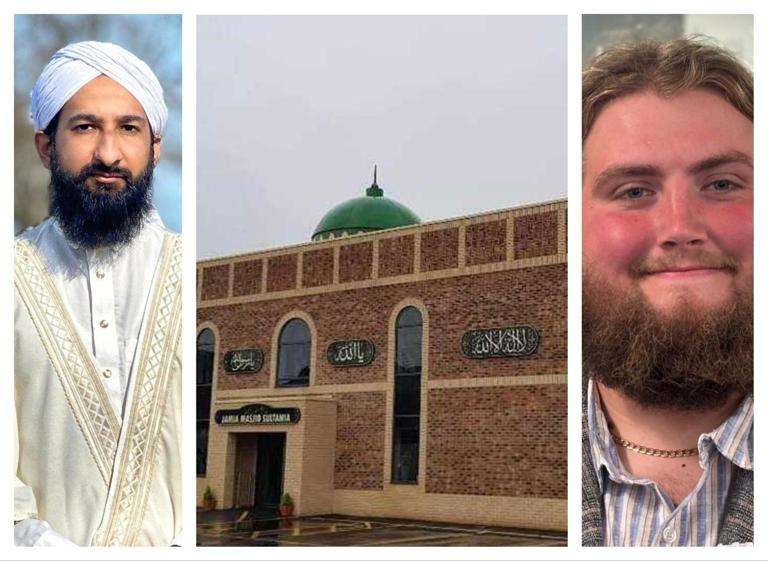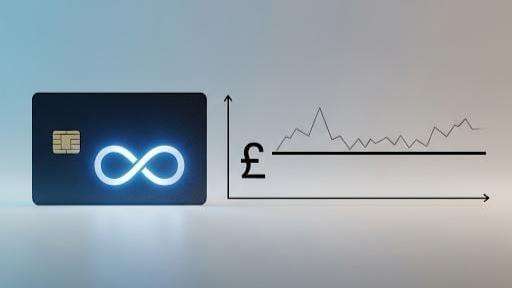 The U.S. has taken an openly critical view of Bangladesh's election procedures under Prime Minister Sheikh Hasina, while India has stressed the polls are an internal matter. (Nikkei montage)[/caption]
The U.S. has taken an openly critical view of Bangladesh's election procedures under Prime Minister Sheikh Hasina, while India has stressed the polls are an internal matter. (Nikkei montage)[/caption]
The tough election season in Bangladesh has highlighted the different interests and diplomatic approaches of India and the United States, as well as their interactions with strategic partners and common rival China.
The governments in Washington and New Delhi said they support a democratic and stable Bangladesh, with general elections scheduled for January 7. But boycotts by the Bangladeshi opposition, street violence and past allegations of fraud have cast a shadow over the polls, and the two countries have chosen very different ways to show this. Bangladeshi Prime Minister Sheikh Hasina and her Awami League are seeking a fourth consecutive term as prime minister, potentially making her the country's longest-serving leader. However, her critics claim that part of her longevity is due to election manipulation, an allegation she strongly denies. The U.S. has signaled it will not tolerate a questionable vote this time, slapping visa restrictions on those deemed "responsible for, or complicit in" undermining the democratic process. Despite this, Bangladeshi authorities have rounded up opposition leaders and activists amid violent protests in recent weeks, while steamrolling ahead with election plans. U.S. calls for "unconditional dialogue" between the parties look unlikely to be heeded. India, meanwhile, has termed Bangladesh's election "an internal matter." "As close friends and partners of Bangladesh, we respect the democratic process in Bangladesh and will continue to support the country's vision of a stable, peaceful and progressive nation," Indian Foreign Secretary Vinay Mohan Kwatra told the media earlier this month. While India touts itself as the world's largest democracy and would prefer democratic neighbors, New Delhi sees Hasina as a generally reliable partner in a neighborhood fraught with anti-India sentiment. The Maldives, for instance, recently elected a president who ran on an explicitly anti-India platform. India also has a history of friction with the opposition Bangladesh Nationalist Party, which is currently boycotting the January election as Hasina refuses its demand to step down to make way for a neutral caretaker government. In the past, the BNP was accused of allowing or even encouraging Indian insurgent groups like the United Liberation Front of Asom (ULFA), an armed separatist organization in India's northeastern state of Assam, and similar outfits to operate from Bangladesh. The BNP also shunned cooperation with India in trade, energy, connectivity and security. Hasina reversed that trend and built a robust partnership with India, including a strong rapport with her Indian counterpart, Narendra Modi. Criticism of the BNP is common in Indian diplomatic circles, including over the recent unrest, which has included many reported cases of arson and clashes between demonstrators and police. "All parties have the right to protest, but they should be peaceful," said Veena Sikri, India's former high commissioner to Bangladesh. She also noted that the BNP had boycotted the election in 2014, only to later criticize it for being non-participatory and undemocratic. "This does not ring true," Sikri said. Some Indian observers have been taken aback by Washington's tough stand, believing the Americans are surely aware of Hasina's importance to India. "The U.S. is complicating our ties with Bangladesh by pressuring Hasina," said Kanwal Sibal, a former Indian foreign secretary. "Our biggest regional success is with Bangladesh under Hasina, and she is not in America's good books." C. Rajamohan, a senior fellow at the Asia Society Policy Institute, Delhi, said the BNP has used the Bangladeshi diaspora effectively to make a case to U.S. leaders about democratic backsliding in Bangladesh. "But Hasina has been reluctant to engage U.S. opinion makers [and] failed to make a positive impression," he said. The China factor could help explain Washington's firm hand as well as India's surprise at it. India, the big power in the region, played a crucial role in supporting Bangladesh's independence from Pakistan in 1971. But in recent years, China has invested heavily in Bangladesh, challenging India's position. China is Bangladesh's top defense supplier as well as a major trade partner and investor. China has criticized the U.S. for interfering in Bangladesh's election. The deepening relationship between China and Hasina-led Bangladesh -- whose location on the Bay of Bengal makes it an important partner for the U.S. Indo-Pacific strategy -- might not sit well with Washington. Hasina has made some efforts to improve ties with the U.S., a key market for Bangladesh's garment industry and an important investor. She took a smiling selfie with Biden at the Group of 20 summit in India and attended a reception with the president on the sidelines of the U.N. General Assembly in New York in September. But the outreach does not appear to have eased suspicion about her pro-China tilt among American policymakers.From India's perspective, this is what brings Dhaka and Hasina even closer together. New Delhi is concerned that a transition to the BNP will weaken its influence and open the door for China to expand and strengthen its interests. The Awami League, on the other hand, seems to be hoping that the India-US relationship will allow India to intervene and ease the US government's pressure on Hasina's government. India and the U.S., whose warming ties are being tested by other issues as well, exchanged views on Bangladesh at a recent 2+2 meeting of foreign and defense ministers. Kwatra, the Indian foreign secretary, told reporters that "we shared our perspective very, very clearly. ... It is not our space to comment on the policy of a third country." There has been no sign of the U.S. softening its attitude. A Human Rights Watch report issued Sunday says nearly 10,000 opposition activists have been arrested. "The government is claiming to commit to free and fair elections with diplomatic partners," Julia Bleckner, senior Asia researcher at HRW, was quoted as saying, "while the state authorities are simultaneously filling prisons with the ruling Awami League's political opponents." Bangladesh's election outlook remains murky, and diplomatic challenges are likely to follow for the U.S. and India alike. Sibal, the former Indian foreign secretary, worries that if the BNP somehow manages to return to power, it could affect the dynamism of India-Bangladesh ties. But he was hopeful that regardless of who is in charge in Dhaka, India's rising global profile and economic strength will prompt Bangladesh's next government to be pragmatic and engage with New Delhi. Source: NikkeiAsiaPresident of the US @JoeBiden greets and exchanged pleasantries with Prime Minister #SheikhHasina and @drSaimaWazed today at the #G20Summit in New Delhi. @POTUS also took a selfie with the PM and her daughter. pic.twitter.com/5ditPgFmjZ
— Awami League (@albd1971) September 9, 2023
_7.jpg)


_9.jpg)



.svg)

